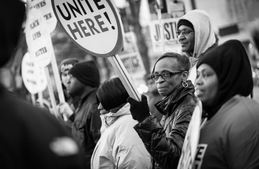 Before I begin I would like to acknowledge that the inspiration and a great deal of the insight from this post comes from the book The Way of Tenderness: Awakening Through Race, Sexuality and Gender by Zenju Earthlyn Manuel. The wisdom that she shares throughout the book on the intersection of inequality and spiritual community is profound and I encourage you to seek out this book to go deeper into the small pieces I touch on here in this post. In light of the events last week, I have seen and heard many in my yoga community (which for me is also my spiritual community) speaking to this idea of oneness. I have long been a proponent of the same message. When I feel unable to hold injustices perpetrated against myself or others, I harp back to holding the space for myself and my students that we are all one. This reminder that underneath all of our differences we are spirit in form. Yet as I've sat with this in the last few years, it has rung increasingly hollow and I have had trouble reconciling the injustice and injury I see with this philosophy of oneness. When I picked up her book, I began to understand why. In her book, Zenju Earthlyn Manuel writes that the problem within many spiritual communities is that there is not discourse happening around race, sexuality and gender. It is assumed that because we are spiritual, we transcend the body and the identities we relate to are of no importance in our spiritual awakening. She counters that arguing that when we do not talk about these issues that it seems as though everything is well and good, but in actuality, there is deep underlying tensions within the community. She writes:
"This tension is our most scared time. To access this sacred time we must have common ground, we must stand at the water together with all of our problems. Many of us consider being human to be our common ground. This perspective can negate our unique differences and end up causing more tension. Being human is not enough common ground to navigate our challenges. If we could consider our common ground as trust we would be more able to remain open to the struggles. What are we trusting? We are trusting that what happens between us is the path by which we must come to awaken as human beings. We must stick to this path with great integrity no matter how difficult." This idea of oneness comes from a beautiful place and I recognize that teachers who speak about this are speaking about it with the best of intentions and from a place of love and open-heartedness. But therein lies the problem—oneness is a beautiful idea if we all walked around the world free of the deeply ingrained stereotypes that we all, myself included, harbor in the backs of our minds. If we walked around blind to race, then a resume with the name Jamal would get just as much attention as resume with the name John. If the world was blind to gender, women could walk down the street dressed however they liked and not worry about being raped. If we walked around the world unaware of any difference in sexuality or gender expression, then gay and lesbian couples could kiss wherever they wanted and not fear reprisal and Trans folk would have no problem using the bathroom they felt fit their gender identity, because we wouldn't see the differences. However, we live in a world where we all have unique expressions of our humanness. And through the expressions of that humanness we each have individual experiences that will be defined not only by our race, sexuality and gender but also by the size of our bodies, our age, whether we are able-bodied and the class that we are in. When we deny, through this idea of oneness, that individuals have their own unique experiences of being in the human body, we are denying that the stories that the share around how they are treated in these bodies are not of importance. When we use the rallying cry of "we are all one" it takes us back to #AllLivesMatter and away from #BlackLivesMatter. We negate the unique experience of persecution, hurt, humiliation and inequality experienced by a group. And just like all lives do matter, we are all one, but until we can eradicate the ingrained judgement and stereotyping we all do in our day to day lives it is a moot point. For now, our work as a yoga community is recognizing and allowing for all of the unique experiences of being human and the stories that come with each one of those incarnations. As Zenju Earthlyn Manuel writes, "we must stand at the water together with all of our problems" and together we must hold the space for each life to be recognized as individual, beautiful and worthy. We must step forward building bridges of trust and allowing safe spaces where people of different races, sexuality, gender expressions, body types, ages and ability feel welcomed and seen in our yoga communities. It is not enough to say we are all one, it is time we looked around our yoga classes and asked ourselves "who is missing?" and then asked the even harder question of "why?"
0 Comments
Leave a Reply. |
AuthorYoga teacher, sound healer and explorer of the inner landscape. Join me! Archives
December 2021
Categories
All
|
 RSS Feed
RSS Feed